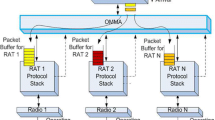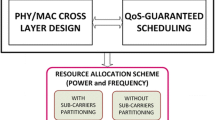Abstract
From a multimedia applications perspective, there is an ever increasing demand for wireless devices with higher bandwidth to support high data rate flows. One possible solution to support the demand for higher bandwidth is to utilize the full spectrum by simultaneously using multiple channels for transmission. Recent approval by the Federal Communications Commission (FCC) has led to considerable interest in exploiting Ultra Wideband (UWB) access on an unlicensed basis in the 3.1--10.6 GHz band. Currently, the IEEE TG802.15.3a standards group is in the process of developing an alternative high-speed link layer design conformable with the IEEE 802.15.3 Wireless Personal Area Network (WPAN) multiple access (MAC) protocol. One of the proposals, based on the concept of Orthogonal Frequency Division Multiplexing (OFDM), divides the spectrum into multiple bands and achieves channelization through the use of different time-frequency codes. These multiple channels can help satisfy the increasing demand for higher bandwidth in order to support high data rate multimedia applications. In this paper, we present a QoS-aware, multi-channel scheduling algorithm that simultaneously utilizes the various channels available in the UWB network.
Similar content being viewed by others
References
M.-G.D. Benedetto and B.R. Vojcic, Ultra wide band wireless communications: A tutorial, Journal Of Communication and Networks 5(4) (2003) 290–302.
E. Coffman, M.R. Garey and D.S. Johnson, An application of bin-packing to multiprocessor scheduling, SIAM Journal of Computing 7 (1978) 1–17.
J. Ding, L. Zhao, S. Medidi and K. Sivalingam, MAC protocols for ultra-wide-band (UWB) wireless networks: Impact of channel acquisition time, in: Proc. SPIE ITCOM (Boston, MA, 2002).
X. Dong and T.-H. Lai, Distributed dynamic carrier allocation in mobile cellular networks: Search vs. update, in: Proceedings of the 17th International Conference on Distributed Computer Systems (1997).
A.B. et al., Multi-band OFDM physical layer proposal for IEEE 802.15 task group 3a, IEEE P802.15-03/268r2, Multiband OFDM Alliance (2003).
FCC First Report and Order, Revision of part 15 of the commission's rules regarding ultra-wideband transmission systems (FCC 02–48), ET-Docket (2002) 98–153.
J. Foerster, E. Green, S. Somayazulu and D. Leeper, Ultra-wideband technology for short- and medium- range wireless communications, Intel Technical Journal 5(2) (2001). http://developer.intel.com/ technology/itj.
M.P.E. Group, MPEG Standards', (2004) http://www.chiariglione. org/mpeg/.
IEEE 802.15 Working Group for WPAN, Part 15.1: Wireless medium access control (MAC) and physical layer (PHY) specifications for wireless personal area networks (WPANs), IEEE Std 802.15.1, (2002).
IEEE 802.15 Working Group for WPAN, Part 15.3: Wireless medium access control (MAC) and physical layer (PHY) specifications for high rate wireless personal area networks (WPAN), Draft P802.15.3/D17-pre (2003).
N. Jain, A. Nasipuri and S.R. Das, A multichannel MAC protocol with receiver-based channel selection for multihop wireless networks, in: Proceedings of IEEE International Conference on Computer Communication and Networks (ICCCN2001) (Phoenix, AZ, 2001).
J. Jiang, T.-H. Lai and N. Soundarajan, On distributed dynamic channel allocation in mobile cellular networks, IEEE Transactions on Parallel and Distributed Systems 13(10) (2002) 1024–1037.
J.R. Jump, YACSIM Reference Manual. Rice University, Department of Electrical and Computer Engineering, version 2.1 (1993).
L.D. Nardis, P. Baldi and M.-G.D. Benedetto, UWB Ad hoc Networks, in: Proceedings of IEEE International Conference on Ultra Wideband Systems and Technologies (2002).
A. Nasipuri and S.R. Das, A multichannel CSMA MAC protocol for mobile multihop networks, in: Proceedings of the IEEE Wireless Communications and Networking Conference (WCNC′99) (New Orleans, 1999).
R. Prakash, N. Shivaratri and M. Singhal, Distributed dynamic channel allocation for mobile computing, in: Proceedings of the 14th ACM Symposium on Principles of Distributed Computing (1995).
A. Rangnekar and K.M. Sivalingam, Multiple channel scheduling in UWB based IEEE 802.15.3 networks, in: Proc. First Intl. Conference on Broadband Networks—Wireless Networking Symposium (San Jose, CA, 2004).
R.A. Scholtz, Multiple access with time-hopping impulse modulation, in: Proceedings of IEEE MILCOM '93 (1993).
K.M. Sivalingam, J. Wang, X. Wu and M. Mishra, Improved online scheduling algorithms for optical WDM networks, in: Proceedings of DIMACS Workshop on Multichannel Optical Networks (1998).
J. So and N. Vaidya, A multi-channel MAC protocol for ad hoc wireless networks, CSL/UIUC Technical Report (Jan. 2003).
J.D. Ullman, Complexity of Sequencing Problems, Chap. 4 (John Wiley, New York, 1976).
G.V. Zaruba, S. Basagni and I. Chlamtac, Bluetrees-scatternet formation to enable Bluetooth-based ad hoc networks, in: Proceedings of IEEE International Conference on Communications (ICC 2001) (2001).
M. Zhang and T.-S. Yum, Comparisons of channel allocation strategies in cellular mobile telephone systems, IEEE Transactions on Vehicular Technology 38(4) (1989) 211–215.
Author information
Authors and Affiliations
Corresponding author
Additional information
Aniruddha Rangnekar is a doctoral student in the Department of Computer Science and Electrical Engineering at the University of Maryland, Baltimore County. He received the B.E. degree in Computer Engineering from the University of Pune, India in 1998 and a M.S. in Computer Science from the University of Maryland, Baltimore County in 2001. From January 2002 to date, he has been involved in graduate research in University of Maryland, Baltimore County. During the summer of 2004, he worked as the MAC development engineer at Staccato Communications, San Diego, CA. His current interests are in the areas of wireless ad hoc networks, multicast routing protocols, ultra wideband communications and MAC protocol development. He is a member of the MACSim group of the Multiband OFDM alliance (MBOA).
Krishna M. Sivalingam is an Associate Professor in the Dept. of CSEE at University of Maryland, Baltimore County. Previously, he was with the School of EECS at Washington State University, Pullman from 1997 until 2002; and with the University of North Carolina Greensboro from 1994 until 1997. He has also conducted research at Lucent Technologies' Bell Labs in Murray Hill, NJ, and at AT&T Labs in Whippany, NJ. He received his Ph.D. and M.S. degrees in Computer Science from State University of New York at Buffalo in 1994 and 1990 respectively; and his B.E. degree in Computer Science and Engineering in 1988 from Anna University, Chennai (Madras), India. While at SUNY Buffalo, he was a Presidential Fellow from 1988 to 1991.
His research interests include wireless networks, optical wavelength division multiplexed networks, and performance evaluation. He holds three patents in wireless networks and has published several research articles including more than thirty journal publications. He has published an edited book on Wireless Sensor Networks in 2004 and edited books on optical WDM networks in 2000 and 2004. He served as a Guest Co-Editor for special issues of the ACM MONET journal on “Wireless Sensor Networks” in 2003 and 2004; and an issue of the IEEE Journal on Selected Areas in Communications on optical WDM networks (2000). He is co-recipient of the Best Paper Award at the IEEE International Conference on Networks 2000 held in Singapore. His work has been supported by several sources including AFOSR, NSF, Cisco, Intel and Laboratory for Telecommunication Sciences. He is a member of the Editorial Board for ACM Wireless Networks Journal, IEEE Transactions on Mobile Computing, Ad Hoc and Sensor Wireless Networks Journal, and KICS Journal of Computer Networks.
He serves as Steering Committee Co-Chair for the International Conference on Broadband Networks (BroadNets) that was created in 2004. He is currently serving as General Co-Vice-Chair for the Second Annual International Mobiquitous conference to be held in San Diego in 2005 and as General Co-Chair for the First International Conference on Security and Privacy for Emerging Areas in Communication Networks to be held in Athens, Greece in Sep. 2005. He served as Technical Program Co-Chair for the First IEEE Conference on Sensor and Ad Hoc Communications and Networks (SECON) held at Santa Clara, CA in 2004; as General Co-Chair for SPIE Opticomm 2003 (Dallas, TX) and for ACM Intl. Workshop on Wireless Sensor Networks and Applications (WSNA) 2003 held in conjunction with ACM MobiCom 2003 at San Diego, CA; as Technical Program Co-Chair of SPIE/IEEE/ACM OptiComm conference at Boston, MA in July 2002; and as Workshop Co-Chair for WSNA 2002 held in conjunction with ACM MobiCom 2002 at Atlanta, GA in Sep 2002. He is a Senior Member of IEEE and a member of ACM.
Rights and permissions
About this article
Cite this article
Rangnekar, A., Sivalingam, K.M. QoS Aware Multi-Channel Scheduling for IEEE 802.15.3 Networks. Mobile Netw Appl 11, 47–62 (2006). https://doi.org/10.1007/s11036-005-4460-6
Published:
Issue Date:
DOI: https://doi.org/10.1007/s11036-005-4460-6




